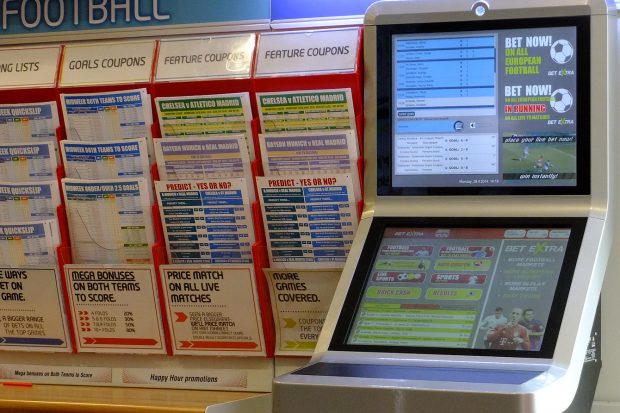 We spend significant time as social workers listening to and understanding the issues, traumas and concerns of individuals and families. Sometimes these issues fly under the radar of statutory health and care services.
We spend significant time as social workers listening to and understanding the issues, traumas and concerns of individuals and families. Sometimes these issues fly under the radar of statutory health and care services.
Gambling addictions are a case in point – not helped by society’s tendency to stigmatise, judge or misinterpret the actions of those who find themselves gripped by them.
These compulsions have multiple causes, cutting across mental and physical health, financial and domestic difficulties and problems in work or education. It makes effective analysis, treatment and support a complex, delicate and nuanced business.
Social workers are, therefore, well placed to interpret these interconnected factors and signpost the help people need to live happier lives.
That’s why I am so pleased to host this guest blog from Jim Rogers, a senior lecturer at the University of Lincoln. Jim has a practice background in addiction services and has led drug and alcohol treatment services in hospital and community settings.
He is a programme leader for post qualifying professional programmes for Approved Mental Health Professionals and Best Interests Assessors.

Jim: When the Methodist minister Gordon Moody took on the role of secretary of the Churches Council on Gambling in 1958 he brought an open minded and compassionate approach to the subject.
He also brought Methodist traditions of social justice to bear and devoted much of his life to helping those with problems related to gambling.
For many years the organisation that bears his name was one of the only sources of help for individuals and families dealing with such problems in the UK; that and the mutual help group Gamblers Anonymous which Moody also introduced to the UK.
Support was not always a certainty
Unlike the situation with drug and alcohol problems, no NHS support was available for problem gamblers. Social workers, along with debt agencies, addiction and mental health services had little to no involvement.
This seems like a missed opportunity to intervene and help. Gambling related harm is clearly linked to poverty, disadvantage and the kinds of issues that often bring individuals and families into the orbit of social workers.
In Australia, their National Association for Social Workers (NASW) has produced clear position statements on the issue.
In the UK, various calls over the years for a bigger place for substance misuse in the social work teaching curriculum did not include calls for discussion of problem gambling and it has remained peripheral or invisible in social work discourse in the UK.

This is partly because problem gambling has remained largely hidden. Organisations who work with individuals experiencing issues relating to mental health, addiction and debt report that very few disclose gambling as a negative factor in their lives.
One organisation that recently conducted a scoping exercise on this issue reported that it was like 'lifting a scab' and they were shocked by the levels of gambling related harm they uncovered.
One reason for inertia and a reluctance to screen for problems has perhaps been the lack of available support services to signpost people towards. Professionals and agencies suggest that they would not know where to refer people if problems were uncovered.
Bringing gambling habits into the open
That situation is changing significantly. Problems relating to gambling are being revealed in a range of ways. High profile debates about fixed odds betting terminals, related advertising and young people as a target market are leading to a reappraisal of our relationship to gambling and the harms connected to its excess.
The whole discourse is moving from a focus on an apparently small number of pathological or problem gamblers towards a broader focus on gambling related harms. which recognise their reach and spread and also the social and environmental factors which are bound up with them.

These developments suggest the increased relevance and need for a social work perspective on the issue. But what support is available to those social workers who do recognise a role for themselves in relation to gambling related harm?
The organisation GambleAware now offer a free e-learning package which has been developed with the Royal Society of Public Health. Taking about two hours to complete, this is aimed squarely at professionals including social workers, to assist them in providing brief interventions to those they come across who are experiencing gambling related harms.
Apps to curb appetites
Technology is increasingly being used to provide innovative means of support for many physical and mental health conditions. For example, problem gambling apps have now been developed which block access to gambling relates sites can help.
Mobile banking apps are also available which some gamblers have suggested have helped them curb their addictions, by identifying and blocking any gambling related transactions on their account.
So, clearly there are a growing number of tools, resources and organisations social workers can work with or signpost in support of those struggling with gambling addiction.
All of this builds on the traditions developed sixty years ago by Gordon Moody. The more we learn, the more we can all do to help.
Find out more
For social workers who do come across individuals for whom gambling is a problem, they can signpost to a range of organisations and resources:
Gamblers Anonymous continue to offer mutual help via over 150 weekly meeting across the UK. They also have a partner organisation, GamAnon, which supports family and friends.
GamCare offers help in a number of ways, including phone lines, web and face to face help, through a network of contracted counselling agencies across the country
The National Problem Gambling Clinic in London, set up in 2008, now sees up to 900 people per year. Now, a new clinic is due to open in Leeds in 2019, run by the Leeds and York Partnership NHS Foundation Trust and the GamCare Network, to provide earlier treatment to more people across the north of England.
Leave a comment